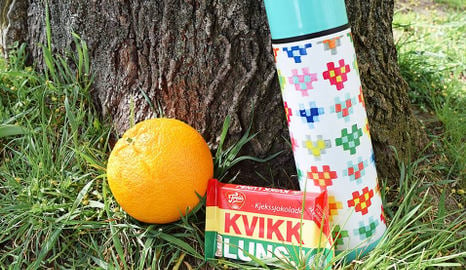NESTLE
Norway’s Kvikk Lunsj foils Nestlé’s KitKat plot
Kvikk Lunsj, the chocolate wafer snack beloved by hikers across Norway, has upset a scheme by the Swiss confectionary giant Nestlé to trademark the four-finger bar concept for itself.
Published: 16 June 2015 22:30 CEST

A Kvikk Lunsj snack laid out during summer hiking trip. Photo: Kvikk Lunsj/Facebook
Nestlé has been battling to trademark the shape of the KitKat, a bar first produced by Rowntree in 1935 in the UK, against the unyielding opposition of the US food giant Mondelēz International.
Mondelēz owns both Cadbury’s, Nestlé’s bitter rival in the UK sweets market, and Freia, the Norwegian confectionary company which launched Kvikk Lunsj in 1937.
In its application, Nestlé argued that since more than 90 percent of British people associated the shape of the bar with the trademark KitKat, it should be allowed to trademark it.
However, Mondelēz successfully argued that since Kvikk Lunsj existed, and was also for sale in some UK shops, Nestlé’s application should be rejected.
Last week, Melchior Wathelet, Advocate-general at the European Courts of Justice, ruled against Nestlé, probably ending its attempt to trademark the shape.
Norwegians consume an average of nine Kvikk Lunsj bars a year, three of which are consumed at Easter, when Norwegians families traditionally go off on cross-country skiing trips fuelled by Kvikk Lunsj calories.
Url copied to clipboard!


 Please whitelist us to continue reading.
Please whitelist us to continue reading.
Member comments